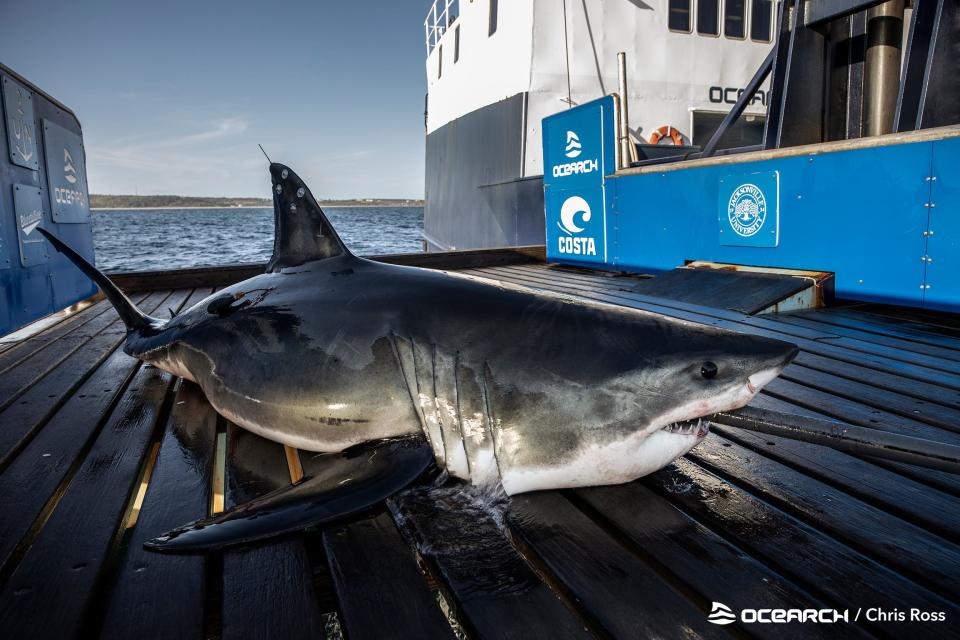9-foot great white shark continues Florida Panhandle visit, pings again off Panama City coast
A 9-foot 7-inch great white shark named Keji appears to be enjoying the waters off Florida's Panhandle as beaches teem with spring breakers.
The shark, tracked by the nonprofit research organization OCEARCH, pinged in the Gulf of Mexico, southeast of Panama City at 9:51 a.m. Friday after pinging nearby three times on Thursday and previously pinging off Panama City on March 3.
A ping means the tag attached to the shark's dorsal fin broke the water's surface long enough to transmit location information to trackers.
Keji arrived in Florida in November. He first pinged southeast of St. Augustine on Nov. 30, then near the Florida Keys on Dec. 13 and off Marco Island's coast Feb. 4 and Feb. 16. He was tracked to the Gulf of Mexico in 2023 and spent the winters of 2021 and 2022 around the state.
Here's what to know about Keji, OCEARCH and white sharks in Florida:
More about great white shark Keji

Keji was tagged by OCEARCH near Ironbound Island, Nova Scotia on Sep. 22, 2021. At the time, the male juvenile white shark measured 9 feet 7 inches and weighed in at 578 pounds.
Great white sharks can grow up to 20 feet long, but most are smaller with adult females averaging 15-16 feet and males 11-13 feet long.
Keji was named after the Kejimkujik National Park and National Historic Site in the region where he was tagged, according to OCEARCH.
Breton the shark 'artist': 1,400-pound great white shark known for its shark 'drawing' pings off Florida coast again
What is OCEARCH?
OCEARCH is a nonprofit organization researching the ocean's giants.
The group studies great white sharks and other keystone species essential for the health of the oceans.
OCEARCH recently finished up its 46th expedition, dubbed Expedition Southeast. It departed from Jacksonville on Nov. 17 and made its final docking in Morehead City, North Carolina on Dec. 15.
During the expeditions, researchers collected previously unattainable data on the animals' migrations, reproductive cycle, genetic status, diet, abundance, and more.
"If we lose the apex predator (sharks) then we lose all our fish and then there are no fish sandwiches for our grandchildren," OCEARCH founder Chris Fischer told the Courier Journal. "That's oversimplified, of course, but the idea is important because many shark species are threatened by overfishing and a demand for shark fins in Asia. Their dwindling numbers jeopardize ocean habitats."
Are great white sharks in Florida waters?
Yes. White sharks swim south when the water gets too cold for them and they lack food sources up north, according to OCEARCH chief scientist Dr. Bob Hueter.
Think of them as the snowbirds of sharks.
Most of them tend to hang out away from the beaches in the continental shelf waters, Hueter said.
What to do if a shark attacks you
National Geographic shares the following tips in case of a shark attack:
Fight: If attack is imminent, defend yourself with whatever weapons you can, advises the ReefQuest Centre for Shark Research. "Avoid using your bare hands or feet if you can avoid it; if not, concentrate your blows against the shark's delicate eyes or gills." A shark's snout is also said to be sensitive.
Don't play dead: If a shark gets you in its mouth, says ISAF's George Burgess, "I advise to be as aggressively defensive as you are able. 'Playing dead' does not work. Pound the shark in any way possible. Try to claw at the eyes and gill openings, two very sensitive areas."
Control blood loss: If bitten, try to stop the bleeding. Leave the water as efficiently, calmly, and swiftly as possible. While many sharks will not bite again, you cannot rule out a second attack.
Get help: Get immediate medical attention, no matter how small the injury.
Most shark attacks happen in Florida
There were 69 documented unprovoked shark attacks around the globe in 2023. The U.S. led the world with 36 attacks and Florida again was the state with the most bites at 16.
Florida shark attacks by county:
Miami-Dade County: 1
Pinellas County: 1
While the U.S. has the most attacks, South Africa has the most shark-related fatalities.
Since 1992, there have been 1,232 shark bites worldwide, according to data from floridapanhandle.com, with white sharks credited as the top biters.
Support local journalism by subscribing to a Florida news organization.
This article originally appeared on Fort Myers News-Press: Great white shark surfaces again off Panama City in Gulf of Mexico

